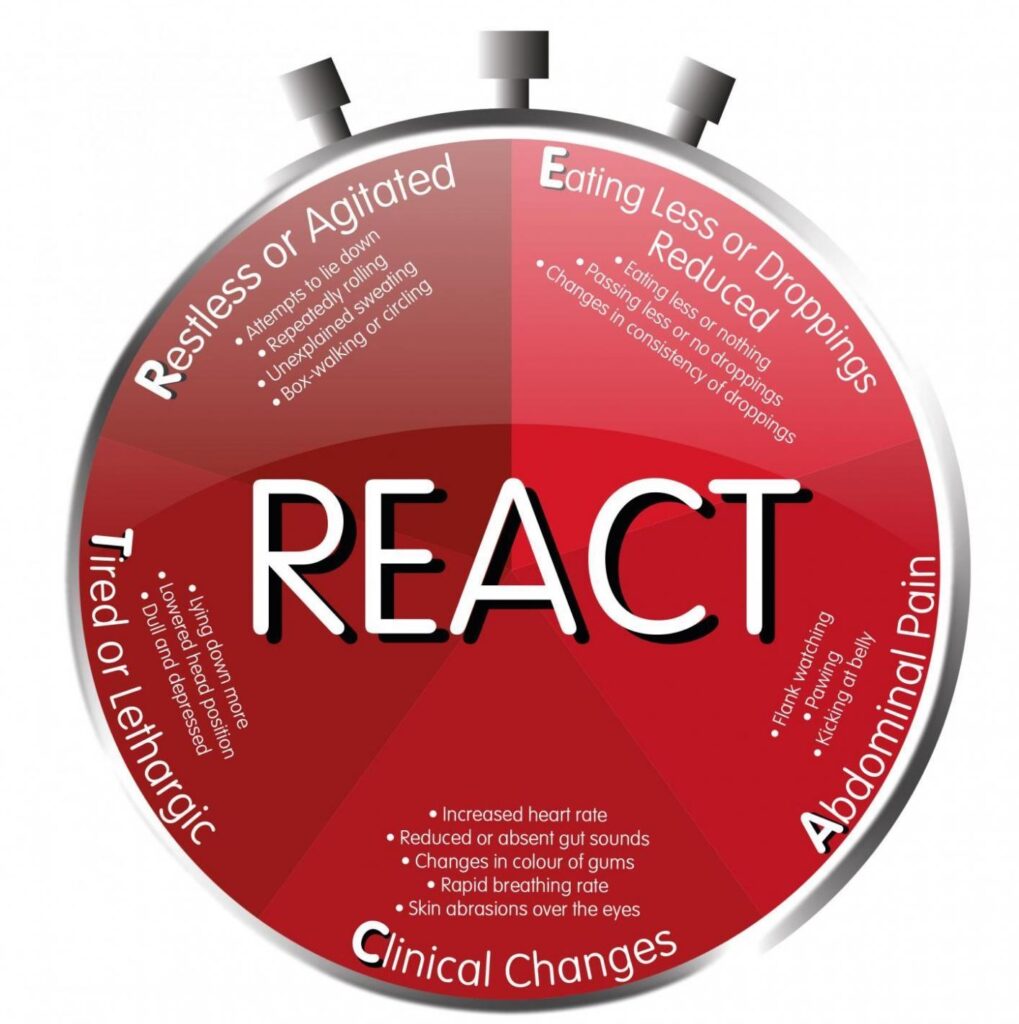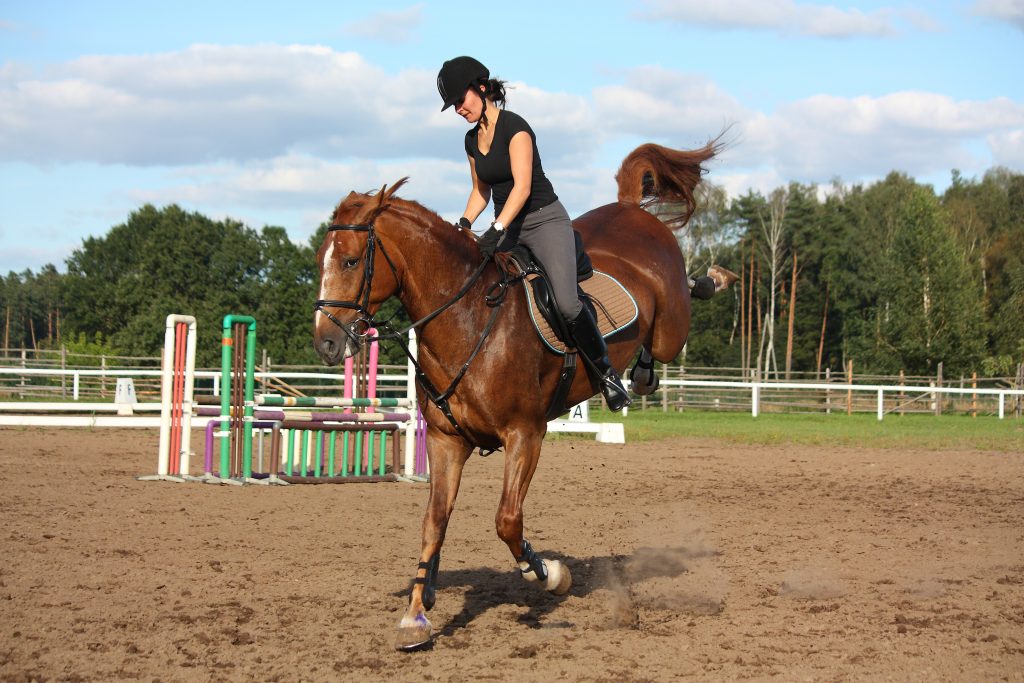Colic is an emergency – if you are concerned about your horse please call our 24/7 helpline immediately. The information below is intended as a guide only – talk to Stride about any specific concerns.
Colic is the most common equine emergency and cause of death in horses worldwide. It encompasses a broad spread of gastrointestinal conditions ranging from mild discomfort to life-threatening emergencies. Prompt recognition, diagnosis, and veterinary intervention are critical to managing colic and preventing serious complications.
Colic is not a specific disease but a general term for abdominal pain, often associated with the gastrointestinal tract. Its causes vary widely, and the condition can manifest in several forms, categorised into the following types of Colic:
- Spasmodic, Gas, Impaction, Sand, Displacements (including Volvulus and Torsions), and Strangulation. Colitis and Enteritis are also grouped with Colic.
Recognising Colic
Early detection is vital and everyone who is involved with horses should be able to recognise Colic as soon as it appears.
Stride Equine Vets is a BHS REACT to Colic champion practice, and we work by the REACT signs, which are the most common and important indicators (based on research from The University of Nottingham).
REACT stands for 5 of the main symptoms of Colic. These are:

R Restless or Agitated
- Rolling, box-walking, or unexplained sweating.
E Eating Less or Droppings Reduced
- Loss of appetite or reduced faecal output.
A Abdominal Pain
- Flank watching, pawing, or kicking at the belly.
C Clinical Changes
- Increased heart rate, altered gum colour, or reduced gut sounds.
T Tired or Lethargic
- Lying down excessively or appearing dull and depressed.
Not all horses exhibit classic signs like flank watching and/or kicking at the belly, making it important to monitor for subtle changes in behaviour or routine. The REACT signs are not an exhaustive list of every possible sign of colic, but instead highlight five key aspects of your horse’s health and actions that should be considered.
Causes of Colic
Several factors can contribute to colic, including:
- Dietary Issues, Inadequate Hydration, Parasites, Sand Ingestion, Stress, Anatomical Factors, Lack of Exercise and Dental Issues.
Diagnosing Colic
Diagnosing colic involves a combination of clinical examination and diagnostic tools. We will assess the horse’s vital signs, perform a physical exam, and possibly use additional tests to determine the severity and type of colic. Common diagnostic procedures include:
- Physical and Rectal Examinations; Checking for reflux, Ultrasound to detect fluid buildup, intestinal thickening, or organ displacement; Blood Tests; Analysing abdominal fluid to detect peritonitis or strangulation.
Treating Colic
The treatment of colic depends on the type and severity of the condition. Treatment options include:
- Pain relief through NSAIDs, Oral or intravenous fluids for hydration and impaction resolution, Laxatives, Anti-Spasmodics to relax intestinal spasms and Surgical Treatment for severe cases involving torsion, strangulation, or displacement, where rapid intervention is critical.
- Post-Colic Care is needed, with close monitoring, gradual reintroduction of feed, and adjustments to diet and exercise.


Preventing Colic
Colic can occur at any time of the year in both grass-kept and stabled horses and there are many potential risk factors. However, there are many simple steps that can be taken to help reduce the risk of it occurring.
- Consistent diet and constant access to clean water. a planned deworming programme, routine dental care, regular exercise, feed quality and slow feeding.
Make a Plan
Colic requires swift action. You should keep these items updated and to hand: your vet’s contact information, your wishes on emergency surgery and a plan for transport to a hospital if needed.
As a REACT to Colic champion, your Stride vet can advise you on these issues and help you write up a plan. We’ve developed a simple form for you to use, which can make the process easier.
Conclusion
Colic is a complex and potentially fatal condition requiring prompt attention. Recognising early signs, understanding causes, and implementing preventative measures are key to minimising risks. With proper management and emergency preparedness, you can improve outcomes and ensure your horses lead healthy lives.
Find out more about Colic on our downloadable Factfile – click on the PDF icon at the top of the page.
If you are concerned about the welfare of a particular horse, please contact us immediately for support. Our emergency line is open 24/7. This website contains general information on horse related welfare matters, but is not advice which should be relied upon to treat any individual horse. Unfortunately, it is not possible in the context of this website to take into account individual situations or consider unusual problems or circumstances.
Whilst we try to ensure that the information within this website is accurate, we can accept no responsibility for the accuracy of the site content. Users who rely on the information in this site do so at their own risk. This website is made available for public viewing solely on the basis that Stride Vets excludes to the extent lawfully permitted all liability whatsoever for any loss or damage arising out of use of this site, or reliance upon its contents.

Call us now for more information
01420 551 365
Equine Services
Your Trusted Equine Partner
Stride Equine Vets provides expert veterinary care for horses in Surrey, Hampshire and the surrounding areas.


